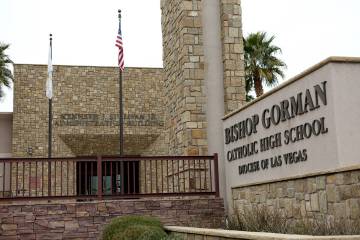Audit: Reporting of Nevada teacher convictions slow
CARSON CITY — The Nevada Department of Education does not have an adequate license revocation process for teachers or administrators convicted of crimes, with notification of arrests taking in some cases up to 1,200 days, an audit released Tuesday shows.
The state’s top public educator said schoolchildren have not been at risk despite the audit findings.
The Legislative Counsel Bureau performance audit of the state Education Department showed that notification of arrests ranged from one day to 1,200 days, with an average of 367 days.
The audit also found that for 10 of 13 cases reviewed, the department’s Office of Educator Licensure was not notified of the arrest by the involved school district. Instead, it learned of the arrest through office staff who followed local news reports.
For five licenses that were revoked, it took from 660 days to 184 days from the conviction date to the revocation.
The audit also found that for two other teachers found guilty of sex crimes in 2013, licenses were not revoked in a timely manner. The office’s website listed both teachers as having active licenses as of March 4, 2014, the audit found.
The audit focused on a time frame of July 2012 to March 2014.
“The lengthy time to revoke licenses of persons convicted of crimes was caused by a lack of supervisory oversight and insufficient procedures for tracking and revoking licenses,” the audit said.
Auditors made nine recommendations to improve the licensure process, all of which were accepted by the department.
The audit was reviewed and accepted by the Legislative Commission’s Audit Subcommittee.
Dale Erquiaga, state superintendent of public instruction since August 2013, said the office has made significant improvements to ensure the revocation process works properly.
“One of the most critical licensure functions is keeping children safe in schools,” he said. “Over the years, probably because of the growth in volume, those processes were not what they should be.”
Erquiaga said the office is now complying with the law and can move expeditiously to revoke the license of an educator convicted of a crime and who should not be in a classroom. School districts are also now required to report arrest information to the department, he said.
But he also noted that while teaching licenses have not always been revoked in a timely manner by the department, local school districts have always done a good job of monitoring their own employees.
“They know, and have known, if an individual committed a crime or shouldn’t be in a classroom,” Erquiaga said. “They took the disciplinary action. What we found in these audit recommendations is, the individuals had been removed from the classroom. It’s just that their licenses had not been revoked.”
Parents should be confident that the appropriate action is being taken at the district level, he said.
Other findings in the audit included the failure of the office to properly issue or monitor provisional licenses. The licenses were being issued for one year instead of a 120-day maximum allowed under state regulations.
The office also had inadequate information to monitor the status of an applicant’s criminal history report. Data entry errors were found in 26 percent of fingerprint cards submitted between July 2012 and December 2013.
The office also did not process the criminal history reports in a timely manner. While the average time improved from 204 days in 2012 to 82 days in 2013, further improvement is needed, the audit said.
“Delays in the process for reviewing criminal history reports increases the risk that the office will not timely identify a provisional licensee with a criminal history that warrants an invalidation of license,” the audit said.
The practice of the office is to invalidate a provisional license upon discovering that an individual had been convicted of a felony. But auditors said licenses could be denied for misdemeanor crimes involving moral turpitude as well, something the office has not yet done.
Misdemeanor crimes that could be included for license denial include child luring, failure to report child abuse or neglect and false imprisonment, among others.
The department is addressing the issue.
Contact Capital Bureau reporter Sean Whaley at swhaley@reviewjournal.com or 775-687-3900. Find him on Twitter: @seanw801.




























